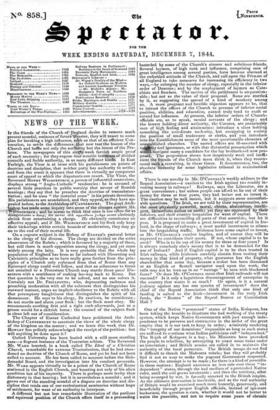There is one novelty in Mr. O'CosszLes weekly address to
the Repeal Association—a caution to the Irish against too readily in- vesting money in railways ! Railways, says the Liberator, are a sgreat convenience ; but unless people can afford to lie out of their money for three or four years, they had better not so invest it. • The caution may be well meant, but it suggests some uncomfort- able questions. The Irish, we are told by their representative, are the most physically powerful, moral, chaste, abstemious, intelli- gent, industrious nation on earth ; yet they are oppressed by their inferiors, and their country languishes for want of capital. There are difficulties in reconciling all parts of that assertion; but let it pass. It is proposed to make a great investment of capital in Ire- land, in the shape of railways; • a most useful investment to stimu- late the languishing traffic. Irishmen have some capital to invest, as Mr. O'CONNELL'S caution implies, and of course they will be expected to contribute their quota. If not, whose capital is to be used ? Who is to lie out of his money for three or four years ? Is it always somebody else's money that is to be demanded for the use of Ireland ? And if English capital is to be thus trusted in Irish railways, while Irishmen carefully abstain from vesting their money in that kind of property, what guarantee has the English shareholder that some day, because a stoker has been dismissed or an English or Scotch navigator used upon the work, the rails may not be torn up in an " outrage " by men with blackened faces ? Or does Mr. O'CONNELL mean that Irish railroads will not succeed ? Is it only a lugubrious discouragement of enterprise in the country that wants it so much ? Or again, is it a natural jealousy against any but one species of investment ? does the chief of the Repeal Association think that only one kind of funding is suited to the Irish—investment in the truly Irish funds, the " Rentes " of the Repeal Bourse or Conciliation Hall ?


























